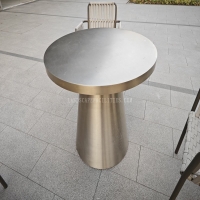Welcome to the website for landscape facilities products and knowledge.
How does the choice of countertop material impact the embodied carbon footprint of a landscape bar counter?
The selection of countertop materials for landscape bar counters significantly influences their embodied carbon footprint—the total CO₂ emissions generated throughout a material's lifecycle from extraction to disposal. Dense natural stones like granite or marble require energy-intensive quarrying and transportation, contributing substantially to embodied carbon. Conversely, locally sourced reclaimed wood or recycled composite materials dramatically reduce this footprint by minimizing processing energy and transportation emissions.
Concrete counters, while popular, carry high embodied carbon due to cement production; however, incorporating recycled aggregates or using low-carbon cement alternatives can mitigate this impact. Innovative materials like recycled glass terrazzo or bio-based composites offer both durability and carbon sequestration benefits.
Material thickness and maintenance requirements also play crucial roles. Thinner profiles reduce material volume and associated emissions, while low-maintenance materials extend the counter's lifespan, distributing embodied carbon over more years. Ultimately, prioritizing locally available, recycled, or rapidly renewable materials creates landscape bar counters that blend functionality with environmental responsibility, reducing embodied carbon by up to 60% compared to conventional options.
Related search:

Recommendation
Outdoor Metal Table - Classic Outdoor Furniture, Stainless Steel Table, Durable and Reliable